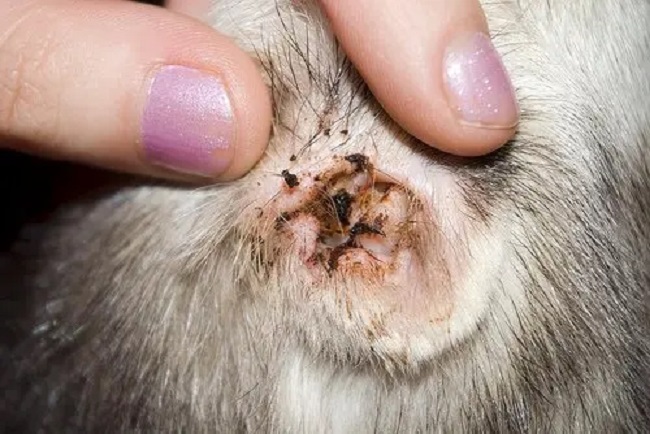Ear mites are a common problem in cats, causing discomfort and irritation. If left untreated, they can lead to severe infections and complications.
While professional veterinary care is essential, there are several home remedies that can help control the situation and offer relief to your feline friend.
This comprehensive guide will provide you with a detailed understanding of ear mites in cats and effective home remedies for their treatment.

Understanding Ear Mites in Cats
Ear mites are tiny, spider-like parasites that live in the ears of cats. They feed on the ear wax and oils, causing inflammation, itchiness, and discomfort.
Read Also:
Symptoms of ear mites include frequent scratching, head shaking, dark discharge from the ears, or a foul smell. In severe cases, ear mites can cause infections leading to hearing loss if not treated promptly.
Home Remedies for Ear Mites in Cats
Before proceeding with home remedies, it’s important to consult with your vet to ensure these methods are safe for your cat’s specific situation. Once you have the all-clear, here are some remedies you can consider:
1. Olive Oil
Olive oil is a natural remedy that can suffocate ear mites and soothe the inflamed ear canal. Using a dropper, apply a few drops of lukewarm olive oil into the cat’s ear. Massage gently, then clean with a cotton ball. Repeat this process every other day for six weeks.
2. White Vinegar
White vinegar can help remove debris and dirt from the cat’s ear, which can reduce the food supply of ear mites. Mix equal parts of white vinegar and warm water.
Using a dropper, put a few drops into the cat’s ear, massage gently, and then wipe the ear flap with a soft cloth. Repeat this every other day for a week.
3. Yellow Dock Root Extract
Yellow Dock Root extract is another natural remedy known for its effectiveness against ear mites. Mix nine drops of the extract with one tablespoon of water and apply it to your cat’s ears. Repeat every other day for three weeks.
4. Aloe Vera
Aloe Vera is known for its soothing and healing properties. Apply pure Aloe Vera gel (without additives) on the outer part of your cat’s ear to help relieve itching and inflammation caused by ear mites.
The Role of Proper Hygiene and Cleaning
In conjunction with these home remedies, maintaining proper hygiene is crucial in the fight against ear mites. Regularly clean your cat’s bedding, toys, and other items to prevent re-infestation.
Additional Preventive Measures Against Ear Mites
In addition to the home remedies mentioned, taking preventative measures can significantly reduce the risk of ear mite infestation in your cat.
Regularly Check Your Cat’s Ears
Inspect your cat’s ears regularly for any signs of infection, like redness, swelling, excessive wax, or unpleasant smell. This not only helps catch ear mite infestations early but also other potential ear problems that might require veterinary attention.
Maintain a Clean Environment
Ear mites can survive in the environment for a short time. Regularly cleaning your home, especially areas where your cat frequents, can reduce the chances of ear mite infestation. Regularly wash and clean your cat’s bedding, toys, and grooming tools.
Use Preventive Treatments
Many flea and tick treatments also protect against ear mites. Consult with your vet about using such products as a preventive measure, especially if your cat has had ear mites before or is at high risk of getting them.
Quarantine New Pets
If you’ve recently added a new pet to your home, especially a stray or a shelter animal, it’s a good idea to have them checked for ear mites before introducing them to your current pets. Quarantine the new addition until you’re sure they’re free of ear mites.
Importance of Veterinary Care
While home remedies can provide temporary relief, it’s crucial to seek professional help for a proper diagnosis and treatment plan. Home remedies can sometimes alleviate symptoms without completely eradicating the mites, leading to a recurrence.
A vet can prescribe more potent treatments if necessary, such as topical medications or injections, to ensure that the ear mites are entirely eliminated.
Read Also:
Conclusion
Ear mites in cats can cause significant discomfort and health problems if left unchecked. While these home remedies for ear mites in cats can provide relief, they should not replace professional veterinary care. Always consult your vet before trying any home treatment to ensure it’s safe and effective for your feline friend.
























